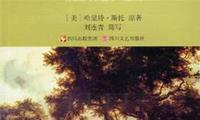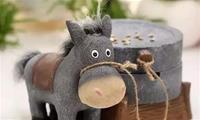哈姆雷特讀後感英文(一)
Created in 1600 —— 1601 Hamlet had been admired for centuries. Is to at the moment, still feel his vocal. And all this is not the plot, also not only only is excellent literary technique, it is reflected by the problem. In general,
It describes a kind of extremely primitive, people.
The hero Hamlet first dealing with your original ideal world. At the start of the benefits in some Hamlet "childhood", he did you experience any huge setback, living environment is more simple, always learning western orthodoxy. But in the end, noble, to adore the father died, less than a month is virtuous mother remarried his uncle to usurp the throne. This made him wonder in the world. And after this doubt directly contributed to his hesitation. He realized that they are not perfect it, chastity but desire, moral victory over greed. He thinks you should go to revenge, but the moral person is his mother; His uncle killed his father and he is a person, is a person's thoughts. But even if revenge success, again how? He said: "to be or not to be, this is a question worth thinking about" life is a pain, but the fear of death and have less absolute. He met a problem, can't answer is unavoidable.
Hamlet's situation is not the only, the life of big hands to hold each one is so tight.()
The old king's death, which are not related and queen. But as a woman she faces two kinds of selection, it is moral or desire. She chose the latter. However she scorned by the Hamlet and criticism, moral emptiness has brought her considerable pain, in fact, the queen is a kind person, she is not morally repugnant. She is to choose what kind of misfortune, not in the selection of your own destiny.
The new king, the uncle usurped the throne, he is the biggest villain in the play leading role. He wanted to the throne, and to the queen with desire. But the king was others. Is his brother, he don't deserve the throne. He, like all of the faces the loss of the ideal world in my heart. But he strenuously to win, but at the moment, he was a hero general spirit, he bravely to fight for originally do not belong to own. But it is also the tragedy. He paid the price, his hands stained with the blood of others, cannot repent. In later, he found Hamlet after knowing the truth, he began to save themselves may lose the happiness of life. He hovered between sin and rational, in the end he didn't jump out, died in his own sword.
Le for, and the fate of me Mr Li chardonnay with Hamlet striking similarities. In selection of to be or not to be, I am Mr Li xia chose the latter, she chose to suicide. In the selection of revenge or not, le for Hamlet is completely opposite the avengers, "so am I a noble father die in vain, so a good younger sister just this go crazy?… my revenge chance will come one day." In revenge and "inevitable" death on this matter, all of the selected point to the same destination.
Unlike Hamlet's stagnant, others struggle for action. New killed the old king, the king and tried to confess to clear their iniquity, and to attempt to kill Hamlet through to keep the throne. Le for and implement the plan together, in an attempt to let Hamlet to pay for his father's death. But in the end? The new king was dead, he might say the revenge. Le for dead, plan to fail. Hamlet died on the others for his revenge. ……
Someone said that the story of Hamlet is too far-fetched, how could all die. But that is precisely the reality. The article shows a group of people who fight against the fate to us of the final end. They try to change your fate, as a result, what also have no save. They try to restore the past, what the result. This kind of helpless, depends on each person, perhaps the biggest misfortune is man himself. "Hamlet" type of glass with each and every one, every aspect, and all the time.
Such thing as fate is a kind of existence, how he would like a shadow, and we was like peas and carrots, like sunshine and warm the heart, but more often, deep and terrible like a nightmare. "The will of god dominate everything", this sentence, there is no doubt quite penetrating.
哈姆雷特讀後感英文(二)
“To be, or not to be, that is the question”。 But after answering this question, what comes next? To be in what kind of ways may bring you the value of life? And is the value precious enough for you to continue living? These are questions that can never be solved. Hamlet chose to live, in order to revenge the tragic death of his honest father, the Danish king. On account of Hamlet was so kind, he missed the best chance of killing his uncle, the murderer of his father. The uncle, who was the new king, devised several plans to kill Hamlet, indirectly killed Hamlet’s beloved Ophelia 、 Ophelia’s brother and father, and Hamlet’s mother, the new queen who was married to his uncle. These tragedies finally forced Hamlet to make his decision, and stabbed the sword of revenge to his uncle. Unfortunately, Hamlet was already hurt by a sword with poison on it and would be dead quickly at the moment. It was the kindness and hesitation made him fail. For his father, died while having a grasping dream and went to hell for that. Hamlet didn’t kill his uncle while he was praying because if he killed him at that time, he would have gone to heaven. Hamlet didn’t want to return good for evil, this irresolute nature caused the failure of his revenge. But why would god send a person to heaven or hell only considering what he’s thinking about at the last moment of life? Is that really fair? There is no doubt that Hamlet lived in a period of time that everybody was “crazy” and everybody except Hamlet was unaware of the truth. Hamlet even had to fake madness to prevent others from having suspicion. So why being sober when everybody else is drunk? Why being normal when everybody else is mad? It’s to keep your soul clear from being stained, it’s to stop cheating yourself when the truth is already out. It’s worthwhile to die for bringing out the truth, cause living with the concealed truth is worse than dying, especially when the truth that everyone should see is buried with your own hands. “To die - to sleep! But in that sleep of death what dreams may come”, who knows? The heaven loss of life in the play brought us shock, and in a short while, kept us from making the same mistake. But even this does not last too long. Time flies, but even flying time can not stop us from making the tragedy happens again and again. Instead, time took the sadness and regret away, weakened the memory. No more left but the sad touching story and the melody from fair Ophelia when she drowned in running stream. It’s not just a play, it’s something that is happening on the earth every moment. People never learn, soon the laughter and cheers may replace the lamentation, like the newborn roses covered the dead branches in spring. It’s the law of nature, living people continue living, death brings several days of weeping, but what remains? Nothing but dust and soil. This happened before, it’s happening now, but in the future (we hope) this shall never happen again.
哈姆雷特讀後感英文(三)
Were one to have the profound hatred, were one to avenge and harm his family who seems too far to harm, he would be either a hero or a monster. Should he fight the unbeatable foe and right the wrong, should he bear with unbearable sorrow, should he ruin himself in twisted enthusiasm, he would be Hamlet.
Among all the masterpieces of William Shakespeare, “Hamlet”, undoubtedly is worshipped and as one of the most successful and admired tragedies, while the character Hamlet remains one of the most loved dramatis personas in all-time history of literature.
To have read Shakespeare's “Romeo and Juliet” by the age of 16, I was moved to tears, while having no empathy with his another great one “Tempest”。 Presumably when I get 60 or older, I could be wise enough to understand the latter, but find it nothing worthwhile to go over the former one, where lays a romantic story that the only youngsters are addicted to. But it's a fact that whenever in our lifetime after gaining such experiences as getting through hard times, or, finding a real self, from “Hamlet”, we always find something that we consider as perpetuation, which is worth deep thoughts. This is because it highlights Hamlet's choices of life, choices made under certain circumstances of history and society, requested by the fate extraordinary to Hamlet himself, but ordinary to mankind. That is, to some extent, his experiences make a similar one to ours and, his destiny is something we're facing sometime in our own lives.
We're possibly the same. We explore the truth in the dark. We discover facts from the mist. We lose ourselves in determinations. We trespass on which we're forbid to be, hesitates at love and hatred, and struggle to rebuild system of values and spiritual prop in a world without standards and scales of standards.
Hamlet couldn't have been perfect. He is very much a person motivated by irrational enthusiasm, impetuous enough to kill Polonius only to find it's a mistake as the victim is not the king. But somehow it is for his poor enthusiasm, his weakness of humanity, that Hamlet touches countless readers, as everyone makes out himself from the ill-fated prince.
Hamlet's “revenge” isn't so much simply the killing of Claudius, as it is the purging of all the rottenness in the Danish court. And although it costs him his life, he succeeds.
At some time, we all consider how much wrong there is in the world. “Hamlet” gives us a chance to watch an ordinary person consciously choose to say “No!” to the world's wrongness and falsities, and to strike back with power. William Shakespeare held up the mirror to something in us that is precious.
I hear Hamlet thinking, “Too many people waste too much effort doing things that are not worthwhile. It's a bad world, and I am far from a perfect human being. We all end up dead in the end. So I am going to do something worthwhile, and do it right.”()
I hear him wondering, “What is a man, If his chief good and market of his time. Is but to sleep and feed? A beast, no more.”
I hear him whispering “To be, or not to be, aye, there's the point. To die, to sleep, is that all? Aye, all.”
That makes a hero to me, regardless of his blindness and madness which haunt everyone for a while in his time. Thousands of readers may have thousands of their own Hamlet, but there's something that stays the same, that Hamlet dares to run, where the brave dare not go. That's his quest.
Thinks about it.
英文名著簡愛讀後感(一)
This is a story about a special and unreserved woman who has been exposed to a hostile environment but continuously and fearlessly struggling for her ideal life. The story can be interpreted as a symbol of the independent spirit.
It seems to me that many readers’ English reading experience starts with Jane Eyer. I am of no exception. As we refer to the movie “Jane Eyer”, it is not surprising to find some differences because of its being filmized and retold in a new way, but the spirit of the novel remains----to be an independent person, both physically and mentally.
Jane Eyer was a born resister, whose parents went off when she was very young, and her aunt,the only relative she had,treated her as badly as a ragtag. Since Jane’s education in Lowwood Orphanage began, she didn’t get what she had been expecting——simply being regarded as a common person, just the same as any other girl around. The suffers from being humiliated and devastated teach Jane to be persevering and prize dignity over anything else.
As a reward of revolting the ruthless oppression, Jane got a chance to be a tutor in Thornfield Garden. There she made the acquaintance of lovely Adele and that garden’s owner, Rochester, a man with warm heart despite a cold face outside. Jane expected to change the life from then on, but fate had decided otherwise: After Jane and Rochester fell in love with each other and got down to get marry, she unfortunately came to know in fact Rochester had got a legal wife, who seemed to be the shadow following Rochester and led to his moodiness all the time ----Rochester was also a despairing person in need of salvation.
Jane did want to give him a hand, however, she made up her mind to leave, because she didn’t want to betray her own principles, because she was Jane Eyer. The film has finally got a symbolist end: Jane inherited a large number of legacies and finally returned. After finding Rochester’s misfortune brought by his original mad wife, Jane chose to stay with him forever.
I don’t know what others feel, but frankly speaking, I would rather regard the section that Jane began her teaching job in Thornfield as the film’s end----especially when I heard Jane’s words “Never in my life have I been awaken so happily.” For one thing, this ideal and brand-new beginning of life was what Jane had been imagining for long as a suffering person; for another, this should be what the audiences with my views hoped her to get.
But the professional judgment of producing films reminded me to wait for a totally different result: There must be something wrong coming with the excellence----perhaps not only should another section be added to enrich the story, but also we may see from the next transition of Jane’s life that “Life is like a box of chocolates, you never know what you would get.” (By Forrest Gump’s mother, in the film “Forrest Gump”)
What’s more, this film didn’t end when Jane left Thornfield. For Jane Eyer herself, there should always be somewhere to realize her great ideal of being independent considering her fortitude, but for Rochester, how he can get salvation? The film gives the answer tentatively: Jane eventually got back to Rochester. In fact, when Jane met Rochester for the first time, she scared his horse and made his heel strained, to a certain extent, which meant Rochester would get retrieval because of Jane.
We can consider Rochester’s experiences as that of religion meaning. The fire by his frantic wife was the punishment for the cynicism early in his life. After it, Rochester got the mercy of the God and the love of the woman whom he loved. Here we can say: human nature and divinity get united perfectly in order to let such a story accord with the requirements of both two sides. The value of this film may be due to its efforts to explore a new way for the development of humanism under the faith of religion.
英文名著簡愛讀後感(二)
Oliver Twist, one of the most famous works of Charles Dickens’, is a novel reflecting the tragic fact of the life in Britain in 18th century.
The author who himself was born in a poor family wrote this novel in his twenties with a view to reveal the ugly masks of those cruel criminals and to expose the horror and violence hidden underneath the narrow and dirty streets in London.
The hero of this novel was Oliver Twist, an orphan, who was thrown into a world full of poverty and crime. He suffered enormous pain, such as hunger, thirst, beating and abuse. While reading the tragic experiences of the little Oliver, I was shocked by his sufferings. I felt for the poor boy, but at the same time I detested the evil Fagin and the brutal Bill. To my relief, as was written in all the best stories, the goodness eventually conquered devil and Oliver lived a happy life in the end. One of the plots that attracted me most is that after the theft, little Oliver was allowed to recover in the kind care of Mrs. Maylie and Rose and began a new life. He went for walks with them, or Rose read to him, and he worked hard at his lessons. He felt as if he had left behind forever the world of crime and hardship and poverty.
How can such a little boy who had already suffered oppressive affliction remain pure in body and mind? The reason is the nature of goodness. I think it is the most important information implied in the novel by Dickens-he believed that goodness could conquer every difficulty. Although I don’t think goodness is omnipotent, yet I do believe that those who are kind-hearted live more happily than those who are evil-minded.
For me, the nature of goodness is one of the most necessary character for a person. Goodness is to humans what water is to fish. He who is without goodness is an utterly worthless person. On the contrary, as the famous saying goes, ‘The fragrance always stays in the hand that gives the rose’, he who is with goodness undoubtedly is a happy and useful person. People receiving his help are grateful to him and he also gets gratified from what he has done, and thus he can do good to both the people he has helped and himself.
To my disappointment, nowadays some people seem to doubt the existence of the goodness in humanity. They look down on people’s honesty and kindness, thinking it foolish of people to be warm-hearted. As a result, they show no sympathy to those who are in trouble and seldom offer to help others. On the other hand, they attach importance to money and benefit. In their opinion, money is the only real object while emotions and morality are nihility. If they cannot get profit from showing their ‘kindness’, they draw back when others are faced with trouble and even hit a man when he is down. They are one of the sorts that I really detest.
Francis Bacon said in his essay, ‘Goodness, of all virtues and dignities of the mind, is the greatest, being the character of the Deity, and without it, man is a busy, mischievous, wretched thing, no better than a kind of vermin.’
That is to say a person without goodness is destined to lose everything. Therefore, I, a kind person, want to tell those ‘vermin-to-be’ to learn from the kind Oliver and regain the nature of goodness.
英文名著簡愛讀後感(三)
Jane Eyre, is a poor but aspiring, small in body but huge in soul, obscure but self-respecting girl. After we close the covers of the book, after having a long journey of the spirit, Jane Eyre, a marvelous figure, has left us so much to recall and to think:
We remember her goodness: for someone who lost arms and blinded in eyes, for someone who despised her for her ordinariness, and even for someone who had hurt her deeply in the past.
We remember her pursuit of justice. It’s like a companion with the goodness. But still, a virtuous person should promote the goodness on one side and must check the badness on the other side.
We remember her self-respect and the clear situation on equality. In her opinion, everyone is the same at the God’s feet. Though there are differences in status、in property and also in appearance, but all the human being are equal in personality.
We also remember her striving for life, her toughness and her confidence.
When we think of this girl, what she gave us was not a pretty face or a transcendent temperament that make us admire deeply, but a huge charm of her personality.
Actually, she wasn’t pretty, and of course, the ordinary appearance didn’t make others feel good of her, even her own aunt felt disgusted with it. And some others even thought that she was easy to look down on and to tease, so when Miss Ingram met Jane Eyre, she seemed quite contemptuous, for that she was obviously much more prettier than ‘the plain and ugly governess’。
But as the little governess had said: ‘Do you think, because I am poor, obscure, plain, and little, I am soulless and heartless? You think wrong!’ This is the idea of equality in Jane Eyre’s mind. God hadn’t given her beauty and wealth, but instead, God gave her a kind mind and a thinking brain. Her idea of equality and self-respect impress us so much and let us feel the power inside her body.
In my mind, though a person’s beauty on the face can make others once feel that one is attractive and charming, if his or her mind isn’t the same beautiful as the appearance, such as beauty cannot last for, when others find that the beauty which had charmed them was only a falsity, it’s not true, they will like the person no more.
For a long time, only a person’s GREat virtue, a noble soul, a beautiful heart can be called as AN EVERLASTING BEAUTY, just as Kahill Gibran has said, that ‘Beauty is a heart enflamed and a soul enchanted.
I can feel that how beauty really is, as we are all fleshly men, so we can’t distinguish whether a man is of nobleness or humbleness, but fleshly men, so we can’t distinguish whether a man is of nobleness or humbleness, but as there are great differences in our souls, and from that, we can know that whether a man is noble or ordinary, and even obscure, that is, whether he is beautiful or not.
Her story makes us thinking about life and we learn much from her experience, at least, that is a fresh new recognition of the real beauty .()
居里夫人傳英文讀後感(一)
Madame Curie's succebenefits from her parents' good education. In turbulent years, what aristocrat's family background takes to her parents is lives the earth-shaking change. Her parents actually positively face the reality, optimistically and lives joyfully. They have taught Madame Curie, when facing difficulty, does not change own ambition, realizes own ideal firmly. Because the goal is just firm.
Madame Curie only then advances boldly under that difficult condition, moves toward another succefrom a success. And does not care about the money and the honor. Madame Curie experiences many difficulties are not especially unfortunate. In each person's life will have like this with such difficulty. The key is when faces the difficulty, we have made what kind of choice. The peaceful learning environment, she has not learned to study wholly absorbed in noise. Has not studied the fund, she chose herself to work as the worker, deputed gram radium with several year ……Was not the destiny changed our life, was we each one choice which made facing the life, has been doomed finally a person's succeand the defeat. reads the Madame Curie biography, what are more is becomes aware regarding the life feeling. The reason that Madame Curie is revered mother of for the science, is because she chose one to since childhood become mother's of the science path, and the goal was clear in the later each choice, the faith was firm. But our most people were premature gave up our dream, no longer had the direction, no longer made the choice for the faith. Madame Curie is a very not common woman, is a great woman, is a big wisdom woman, is human who is worth us studying well.
居里夫人傳英文讀後感(二)
Madame Curie only then advances boldly under that difficult condition, moves toward another succefrom a success. And does not care about the money and the honor. Madame Curie experiences many difficulties are not especially unfortunate. In each person's life will have like this with such difficulty. The key is when faces the difficulty, we have made what kind of choice. The peaceful learning environment, she has not learned to study wholly absorbed in noise. Has not studied the fund, she chose herself to work as the worker, deputed gram radium with several year ……Was not the destiny changed our life, was we each one choice which made facing the life, has been doomed finally a person's succeand the defeat. reads the Madame Curie biography, what are more is becomes aware regarding the life feeling. The reason that Madame Curie is revered mother of for the science, is because she chose one to since childhood become mother's of the science path, and the goal was clear in the later each choice, the faith was firm. But our most people were premature gave up our dream, no longer had the direction, no longer made the choice for the faith.()







